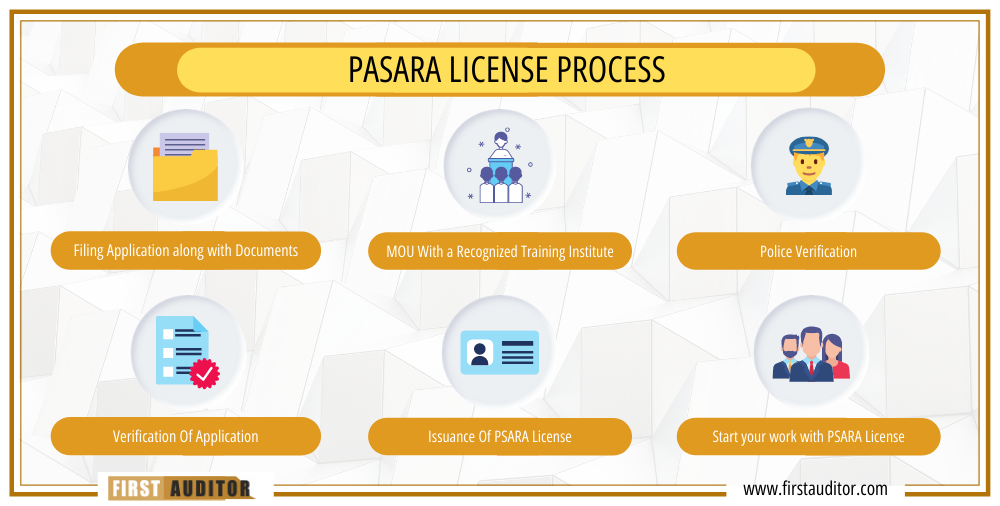In India, obtaining a PSARA License is required before starting a private security company. The term "Private Security Agency" refers to a company that works to provide security guards and other associated services at a location instead of the police. The Private Security Agencies Regulation Act of 2005, or PSARA, is the legislation that controls how private security firms operate.Since the PSARA (act) was passed, a security agency must now get a license from the relevant state controlling authority before starting operations. If this requirement is not met, the law stipulates severe penalties. A private security agency licensing application is submitted to the state's appropriate government. A specific state's entire state or one or more of its districts may be covered by the PSARA License.
Obtaining the relevant registrations, such as a Pan Card, TAN Number, GST, PF, ESI, Shops & Establishment Act registration, each director's ITR, etc., is the initial step in applying for a PSARA licence.
In order to train its guards and supervisors, the applicant must sign into a Memorandum of Understanding with an established training facility. For this aim, numerous security training institutions are recognized by every state.
The applicant submits a Form-I application for police verification; if the applicant is a firm, company, or other association of persons, a separate verification form must be submitted for each partner or director.
The PSARA regulating authority receives the application, which is processed for verification. The governing authority may either grant the License or deny it with a justification after receiving the NOC from the relevant Police authorities.

Not everyone is eligible to hold the position of Principal Officer or Director. In order to qualify for the same, several requirements must be met: -
Checking the following items will make it likely that you land a security guard position:
Rs. 5,000 for one district for two to five districts in a state, 10,000 rupees. 25,000 rupees for the entire state except pondicherry. With the exception of the state of Karnataka, where the government fee is Rs. 50,000/- for the entire state, the aforementioned fees are the same across all of India. Demand draughts or cash challans can be used at specific banks to pay the government charge.
From the moment the PSARA application was submitted, the entire procedure for granting a licence under the PSARA takes about 60 days to complete. A district, five districts, or a state may submit an application for a licence. Each state has a separate application procedure.
A PSARA license can be valid for up to five years, which permits private security firms to operate lawfully and provide services to customers in the designated area. It is important to remember, too, that permits in some states—like Uttarakhand, Madhya Pradesh, and Chhattisgarh—have a one-year validity term. The precise validity period that applies to each state should be known to the agencies.
The respective state authorities have the authority to grant PSARA License on an individual basis.
To apply for a PSARA licence, you must be a qualified individual, one-person business, partnership firm, limited liability partnership, or private limited company.
A PSARA License is valid for a period of 5 years starting from the date of enrollment in most of the Indian states apart from Uttarakhand and Chhattisgarh. Both of these states grant PSARA License for 1 year.
One should submit an application for a PSARA licence renewal at least 90 days before the licence expires.
Yes, even though the Private Security Agencies (Regulation) Act, 2005 governs and regulates the private security industry, each state or union territory has the authority to designate its regulating authority and establish the protocol and regulations for the issue of a PSARA License.
No, according to Section 4 of the PSARA Act, 2005, a company must first get the Controlling Authority's licence or approval before it can offer security services abroad. The directing authority must consult the Central Government before approving an operation abroad.
Anyone who is ineligible in accordance with Section 6 of the PSARA Act, 2005 is ineligible to apply for a PSARA License.
Every State Government needs to appoint an officer of the Rank of Joint Secretary in the Home Department or an officer of equivalent rank to serve as the Controlling Authority under the PSARA.
Yes, if a candidate wants to run their business in more than one state, they must submit a new PSARA License application. Additionally, every state has a different procedure for getting a PSARA License.
Yes, the applicant must confirm that each guard has received a Training Certificate from an approved State training facility.